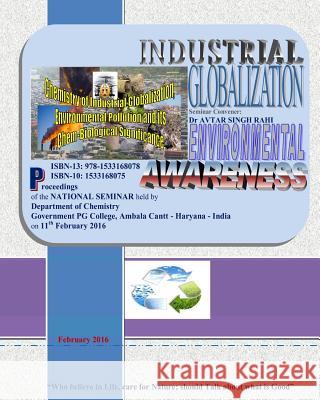Industrial Globalization Environmental Awareness » książka
Industrial Globalization Environmental Awareness
ISBN-13: 9781533168078 / Angielski / Miękka / 2016 / 134 str.
For sustainable development to be achieved, links between the environment and development must be examined. It is also important to consider the end point of development: human well-being. The evolution of ideas on development has made the concept of human well-being central to the policy debate. Human well-being is the outcome of development. Human well-being and the state of the environment are strongly interlinked. Present state, status and applications of research in chemistry, establishing how environmental changes have impacts on human well-being, and showing the importance of environment for human well-being, are among the core objectives of this proposed seminar. Chemistry exerts an enormous influence on human action and is thus inextricably intertwined with the forces that guide human action, especially ethics and certain forms of passion. Such passions are neither vacuous nor disorienting. Rather, they are forces that are fully capable of directing chemists toward research that really matters to each and every human being living and to come. People's ability to pursue the lives that they value, is shaped by a wide range of instrumental freedoms. Human well-being encompasses personal and environmental security, access to materials for a good life, good health and good social relations, all of which are closely related to each other, and underlie the freedom to make choices and take actions. Increasing the real opportunities that people have to improve their lives, require addressing all these components. This is closely linked to environmental quality and the sustainability of ecosystem services. Therefore, an assessment of the impact of the environment on individuals' well-being can be done by mapping the impact of research in chemistry and industrialization on the environment and living-beings. Building better communities through environmental innovation should top the agenda of any research and influence the actions to actualize the dream of sustainable environment. If approached in the right way, more efficient processes using less material and producing less waste can often go hand in hand with economic growth and improve the social well-being. Individual chemists can still achieve a great deal within existing frameworks by the application of sound chemical science, common sense, and good management. Chemists will need to integrate into pure chemistry, the questions of why or why not a particular technology should be abandoned, improved, or adopted on environmental protection grounds. These questions must become as important in research and education and made as concrete as the ubiquitous questions associated with what comprises chemical technology and how it actually works. Certainly the largest sustainability issues, where chemists have so much to offer, will require new approaches that can only be built with long-term commitment. Chemists must learn how to better evaluate and sustain research programs that, instead of rapid publication of incomplete research work. do offer reasonable promise of bringing within, the fullness of time, those critical advances that will genuinely promote the cause of sustainability. Chemistry will have much more to offer by becoming more meaningful to humanity, increasing in attractiveness as a career choice, growing to be more worthy of support, spawning new, large economic developments, and progressing to be more interesting and compelling if chemists work to define and follow their natural and unique role in achieving a virtuous civilization that sees broad validity within the community of living things for the claim to continuity of existence in an environment of natural genesis.
Zawartość książki może nie spełniać oczekiwań – reklamacje nie obejmują treści, która mogła nie być redakcyjnie ani merytorycznie opracowana.











